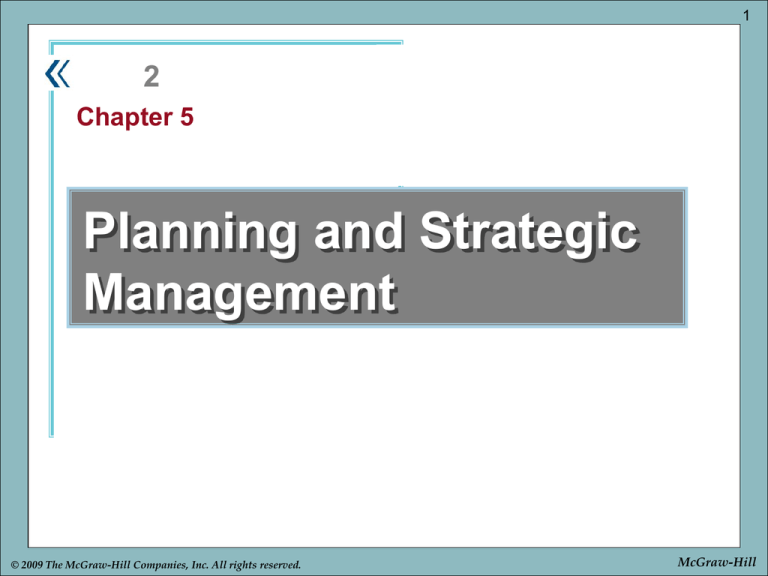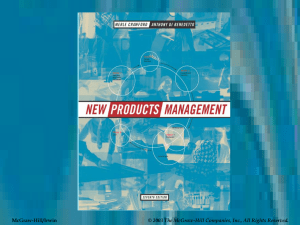
1
part 2
Chapter 5
Chapter
Planning and Strategic
Management
© 2009 The McGraw-Hill Companies, Inc. All rights reserved.
McGraw-Hill
2
Learning Objectives
1. Define planning and distinguish between formal and
functional plans.
2. Contrast strategic planning with operational
planning.
3. Define the Management By Objectives (MBO)
Process.
4. Define strategy and explain the strategic
management process.
5. Define organizational mission and explain how
mission relates to long- and short-range objectives.
6. Discuss the components of a SWOT analysis.
McGraw-Hill
© 2009 The McGraw-Hill Companies, Inc. All rights reserved.
3
The Planning Process
• Planning
• Primary management function
Why Plan?
•
•
•
•
•
McGraw-Hill
Actively affect the future
Means for activity
Multitude of benefits
Positive impacts
Good planning = organizational success
© 2009 The McGraw-Hill Companies, Inc. All rights reserved.
4
Formal Planning
•
•
•
•
Differences in methods
Casual plans
Formal plans
Affecting factors – environment, size, type
Functional Plans
• Classified by function
• Most frequent functional plans
– Marketing, production, financial, personnel
• Interrelated and interdependent
McGraw-Hill
© 2009 The McGraw-Hill Companies, Inc. All rights reserved.
5
Planning
The Planning Horizon
• Short-range plans
• Long-range plans
• Intermediate plans
Operational versus Strategic Plans
• Strategic planning
• Operations or tactical planning
• Distinctions are relative
Contingency Plans
• What-ifs
McGraw-Hill
© 2009 The McGraw-Hill Companies, Inc. All rights reserved.
6
Objectives
•
•
•
•
•
•
•
McGraw-Hill
Objectives – what you are trying to achieve
Long-range objectives
Short-range objectives
Should span all major areas
Be dynamic
Two categories of classifying objectives
Areas for establishing objectives
© 2009 The McGraw-Hill Companies, Inc. All rights reserved.
7
Management By Objectives (MBO)
•
•
•
•
•
•
McGraw-Hill
Definition
Assumption of MBO
When MBO works best
Employees more aware of objectives
Objectives jointly set
MBO can improve motivation
© 2009 The McGraw-Hill Companies, Inc. All rights reserved.
8
Policies
• Definition
• Don’t tell employees exactly what to do
• Procedure
– Step-by-step
– Emphasize details
• Rules
– Leave little doubt
McGraw-Hill
© 2009 The McGraw-Hill Companies, Inc. All rights reserved.
9
Strategy
Levels of Strategy
• Three primary levels
• Corporate Strategies
– Grand strategies
• Four basic corporate strategy types
– Growth strategies
– Stability strategies
– Defensive or retrenchment strategies
– Combination strategies
McGraw-Hill
© 2009 The McGraw-Hill Companies, Inc. All rights reserved.
10
Strategy
Business strategies
• Classifications
– Overall cost leadership
– Differentiation
– Focus
Functional Strategies
• Third primary level
• Primary concern – how-to issues
McGraw-Hill
© 2009 The McGraw-Hill Companies, Inc. All rights reserved.
11
The Strategic Management Process
•
•
•
•
•
Strategic management
Management determines direction
Involves different levels
Differences in formality
Three major phases
– Formulating
– Implementing
– Evaluating
McGraw-Hill
© 2009 The McGraw-Hill Companies, Inc. All rights reserved.
12
Formulating Strategy
•
•
•
•
•
•
McGraw-Hill
Involves developing strategies
The first part
Identifying the Mission
Identifying strategies
Diagnosing performance
Peter Drucker’s three questions
© 2009 The McGraw-Hill Companies, Inc. All rights reserved.
13
Formulating Strategy
• Identifying Past and Present Strategies
• Diagnosing Past and Present Performance
– Examine performance record
• Setting Objectives
– Long- and short-range objectives
McGraw-Hill
© 2009 The McGraw-Hill Companies, Inc. All rights reserved.
14
Formulating Strategy
SWOT Analysis
• An evaluation technique
• Internal and external analysis
– The five force model
Comparing Strategic Alternatives
• Identify feasible strategies
McGraw-Hill
© 2009 The McGraw-Hill Companies, Inc. All rights reserved.
15
Implementing Strategy
• Strategy translation to action
• Necessary actions
Organizational Factors
• Associated costs
• Conflicting policies
Functional Strategies
McGraw-Hill
© 2009 The McGraw-Hill Companies, Inc. All rights reserved.
16
Evaluating and Controlling
the Strategic Plan
• Continuous monitoring
• Making managers aware of the problems
• Take actions necessary
McGraw-Hill
© 2009 The McGraw-Hill Companies, Inc. All rights reserved.






